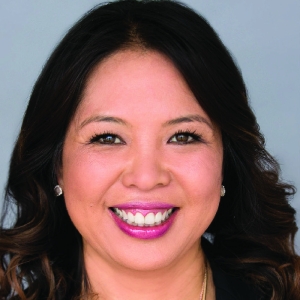USC Social Work Professor Works to Eradicate Violence Against Women and Human Trafficking in the Filipino-American Community
February 20, 2018- Practice
Annalisa Enrile offers a unique perspective to students as they research human rights violations within the Filipino-American community.
Annalisa Enrile, one of the few Filipina PhDs in the field of social work, has distinguished herself as an outspoken voice for social justice. Enrile leads the Philippines immersion program at the USC Suzanne Dworak-Peck School of Social Work, which encourages students to understand the phenomena of trafficking and develop tangible solutions to address sex trafficking and exploitative migrant labor.
USC Suzanne Dworak-Peck School of Social Work: What inspired you to focus your efforts on social issues in the Filipino-American community?
Annalisa Enrile: I have a personal stake in my work because I come from Philippine ancestry. My parents are both immigrants, and I grew up in a working-class Filipino neighborhood in San Diego — but I didn’t understand many of the cultural and political pieces of my upbringing until I went to college.
I went to UCLA, where there’s an active Filipino community, and I began to learn about the issues that have long plagued this population. For example, the myth of the “Asian model minority” has been detrimental for Filipino Americans. High dropout rates and the highest rates of suicide ideation and attempts among Asian Americans have characterized this community.
These circumstances and situations made me dedicated to working in the community — especially after I learned more about domestic violence and the status of women. For example, one year, I learned statistics concerning Filipina women in the Bay Area. At the time, almost every Filipina killed had been murdered by a lover or spouse. So I focused my studies on intimate partner violence (IPV), gender violence against women and eventually, human trafficking.
USC: Where did your research on intimate partner violence begin?
AE: My research centered on dating and intimate partner violence. I followed my undergraduate work with a Fulbright Fellowship in the Philippines, where I studied community responses to IPV in rural, agricultural areas, small barrios and fishing towns. I wanted to examine the grassroots responses that arose in areas with limited law enforcement capabilities.
What I found totally shifted my understanding of the kinds of solutions that are possible, and my work since then has remained true to those roots. Violence and trafficking are not just issues of law enforcement — they’re a human rights issue. Systemic issues like poverty are a contributing factor, and this indicates a need for social justice solutions. I do a lot of innovation work, because the ideas surrounding social justice, transformation and empowerment also fall into the same paradigm as design thinking and innovation.
USC: What are the unique challenges facing the Filipino community when it comes to sex trafficking and exploitative migrant labor?
AE: Filipinos are the fastest growing immigrant group among Asians. It’s also a very silent community, and I think that’s because of our unique relationship to the United States. We were a United States military stronghold in the Pacific for many years — but when the Philippines did not renew the U.S. Bases Agreement, the economy shifted to tourism, including sex tourism (which encourages human trafficking).
At the same time, rapid globalization has led to an urgent need for cheap migrant labor. Today, thousands of Filipina women go abroad each year to work in almost 200 countries. This has driven down the cost of labor and decreased protections for workers. The Philippines was — and still is — notorious for not protecting these workers. They’re sweeping violence, rape and even murder under the rug because they don’t want to jeopardize trade agreements.
USC: What inspired you to apply what you’d learned in the field and become a professor at USC?
AE: The biggest motivator for pursuing my PhD was the desire to support marginalized communities. This isn’t just about Filipino-American communities — these issues affect underserved women and children everywhere. I didn’t initially imagine myself going into academia in full force as a professor and researcher — I was always a community organizer. But USC offered a diverse student body and faculty, as well as the ability to bridge my anti-trafficking work with community action.
In the beginning, the challenge was to raise awareness about trafficking and convince people that this was a full-fledged epidemic. Now that the mainstream community takes trafficking seriously, we can develop real solutions.
USC: How do you translate your knowledge into something your students can sink their teeth into, so to speak?
AE: If you look at the numbers, it would seem that trafficking has gotten worse since when we started our research. But that’s not necessarily true — we can just see it better. It’s clear, though, that traditional intervention models aren’t working.
In the last few years, we’ve developed a design thinking program that immerses students in the process of finding solutions. Over the course of a week, they develop and refine ideas that they then pitch to investors and nonprofits at the end of the program. Some of these solutions have even been incubated for distribution domestically and abroad. Even though we’re working on huge problems, my students give me hope that we’ll find the answers.
To reference the work of our faculty online, we ask that you directly quote their work where possible and attribute it to "FACULTY NAME, a professor in the USC Suzanne Dworak-Peck School of Social Work” (LINK: https://dworakpeck.usc.edu)
